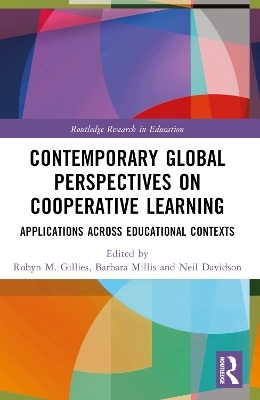
Contemporary Global Perspectives on Cooperative Learning
Routledge (Verlag)
978-1-032-21396-5 (ISBN)
This volume captures contemporary global developments in cooperative learning (CL) across varied educational contexts, levels, and disciplines.
Cooperative learning is widely recognized as a pedagogical practice that promotes socialization and learning among students, from kindergarten to tertiary education and across different subject domains. With chapters from contributors throughout the Global North and South, this comprehensive volume offers a wide-ranging perspective and addresses a range of cooperative learning pedagogies including relational, online, and peer learning, STAD, the Jigsaw model, and dialogic talk. The chapters draw on novel empirical research and theory to highlight best practices in cooperative learning, whilst also considering the challenges, limitations, and factors which drive or inhibit learner engagement and success. Consistent attention is given to the pivotal role of the educator in implementing cooperative learning to maximum benefit to enhance students’ affective, social, cognitive, and metacognitive learning.
Thus, this book will appeal to scholars and researchers across a variety of subjects; and will provide an additional benefit to in-service and pre-service educators who already practice cooperative learning in their classrooms, as well as those who are interested in implementing the model.
Robyn M. Gillies is Professor of Education at The University of Queensland, Australia. Neil Davidson is Professor Emeritus of Education at the University of Maryland, USA. Barbara Millis is an Educational Consultant based in St. Antonio, Texas, USA.
Cooperative Learning and the State of the Field: An Introduction Section 1: Effectiveness, Benefits, and Limitations of Cooperative Learning (CL) 1. Can Cooperative Learning Enhance Student Thinking and Question Generation? 2. Can students learn by teaching their peers during cooperative learning? 3. Positive resource interdependence for young students: a nudge for cooperation but a pitfall for learning 4. “We all keep growing and learning” – Facilitating meaningful educational experiences through peer assisted learning across different educational levels in El Salvador Section 2: Achieving Equitable Learning through Cooperative Learning 5. Giving voice to diversity: Cooperative strategies for intercultural citizenship 6. Teacher perceptions of primary aged students’ social capabilities in Australia, England and Sweden and their importance to inclusive classrooms 7. Individual Group Work Assessment in Cooperative Learning: Possibilities and Challenges 8. Syrian Refugee Teachers’ Perceptions of STAD and Jigsaw Models in Classrooms of Underprivileged Learners in Lebanon 9. Think-Pair-Share and ThinkTrix: Standard Bearers of Student Dialogue 10. Cooperative Learning Through Philosophy for Children Around the World Section 3: Initiating and Deepening Cooperative Learning in Diverse Educational Contexts 11. Developing Reciprocal Peer Tutoring in Irish Medium Schools 12. Developing a Community of Practice for Teacher’s Learning and Implementation of Cooperative Learning 13. Cooperative Learning in Japan as a Core Strategy Deepening Cooperation in Education Section 4: Cooperative Learning in Action 14. Promoting Dialogic Talk during Cooperative Learning 15. A shift to the future: The paradigmatic approach of cooperative learning in online practice 16. Group worthy cooperative learning structures in the college classroom 17. Cooperative Learning for Academic, Personal and Social Development in Higher Education in Africa 18. Cooperative Learning in Engineering Education: The Story of an Ongoing Uphill Climb
| Erscheinungsdatum | 16.03.2023 |
|---|---|
| Reihe/Serie | Routledge Research in Education |
| Zusatzinfo | 23 Tables, black and white; 10 Line drawings, black and white; 17 Halftones, black and white; 27 Illustrations, black and white |
| Verlagsort | London |
| Sprache | englisch |
| Maße | 152 x 229 mm |
| Gewicht | 408 g |
| Themenwelt | Sozialwissenschaften ► Pädagogik |
| ISBN-10 | 1-032-21396-5 / 1032213965 |
| ISBN-13 | 978-1-032-21396-5 / 9781032213965 |
| Zustand | Neuware |
| Haben Sie eine Frage zum Produkt? |
aus dem Bereich


